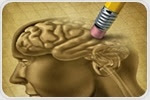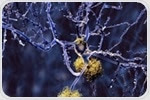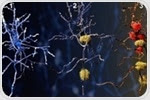| |  Researchers at McLean Hospital will lead a five-year study to investigate the use of electroconvulsive therapy to treat severe agitation and aggression in people with Alzheimer's disease. Researchers at McLean Hospital will lead a five-year study to investigate the use of electroconvulsive therapy to treat severe agitation and aggression in people with Alzheimer's disease. | |
|
| |  Better tactics for detecting, preventing and treating Alzheimer's disease depend on a clearer understanding of cellular-level changes in the minds of patients, and a new study has uncovered novel details about the vulnerability of one type of brain cell. Better tactics for detecting, preventing and treating Alzheimer's disease depend on a clearer understanding of cellular-level changes in the minds of patients, and a new study has uncovered novel details about the vulnerability of one type of brain cell. | |
|
| |  It is recommended that men and women between the age of 20 years and 50 years of age should obtain ~1000mg dietary calcium each day, with a daily upper limit of 2000-2500 mg depending on age and sex. Foods containing calcium include dairy products, leafy green vegetables, some small fish such as sardines, as well as fortified foods such as breakfast cereals. It is recommended that men and women between the age of 20 years and 50 years of age should obtain ~1000mg dietary calcium each day, with a daily upper limit of 2000-2500 mg depending on age and sex. Foods containing calcium include dairy products, leafy green vegetables, some small fish such as sardines, as well as fortified foods such as breakfast cereals. | |
|
| |  A new study by researchers at the Universities of Montana, Valle de México, Boise State, Universidad Veracruzana, Instituto Nacional de Pediatría and Paul-Flechsig-Institute for Brain Research heightens together with German company Analytik Jena concerns over the evolving and relentless Alzheimer's pathology observed in young Metropolitan Mexico City urbanites. A new study by researchers at the Universities of Montana, Valle de México, Boise State, Universidad Veracruzana, Instituto Nacional de Pediatría and Paul-Flechsig-Institute for Brain Research heightens together with German company Analytik Jena concerns over the evolving and relentless Alzheimer's pathology observed in young Metropolitan Mexico City urbanites. | |
|
| |  A scientific strategy that explores therapeutic targets based on the biology of aging is gaining ground as an effective approach to prevent and treat Alzheimer's disease, according to research published in the December 7, 2018 online issue of Neurology. A scientific strategy that explores therapeutic targets based on the biology of aging is gaining ground as an effective approach to prevent and treat Alzheimer's disease, according to research published in the December 7, 2018 online issue of Neurology. | |
|
| |  Female mice destined to develop Alzheimer’s-like pathology and related cognitive impairments display a unique pattern of fluctuation in sex hormones during the ovarian cycle, finds new research published in eNeuro. Female mice destined to develop Alzheimer’s-like pathology and related cognitive impairments display a unique pattern of fluctuation in sex hormones during the ovarian cycle, finds new research published in eNeuro. | |
|
| |  A new study has found that the neurons in the brain can alter their genetic make-up unlike other cells of the body which remain constant. This genetic modification could be the basis for altered protein formation and deposits. This can lead to several neurodegenerative conditions including Alzheimer’s disease, explain the researchers. The study was published in the latest issue of the journal Nature. A new study has found that the neurons in the brain can alter their genetic make-up unlike other cells of the body which remain constant. This genetic modification could be the basis for altered protein formation and deposits. This can lead to several neurodegenerative conditions including Alzheimer’s disease, explain the researchers. The study was published in the latest issue of the journal Nature. | |
|
| |  Today, the only way to definitively diagnose Alzheimer's disease in life is through brain scans and tests of cerebrospinal fluid that must be collected via lumbar puncture. Though cumbersome and expensive, such tests provide the most accurate diagnoses for patients. Today, the only way to definitively diagnose Alzheimer's disease in life is through brain scans and tests of cerebrospinal fluid that must be collected via lumbar puncture. Though cumbersome and expensive, such tests provide the most accurate diagnoses for patients. | |
|
| |  Already affecting more than five million Americans older than 65, Alzheimer's disease is on the rise and expected to impact more than 13 million people by 2050. Over the last three decades, researchers have relied on neuroimaging - brain scans such as magnetic resonance imaging (MRI) or positron emission tomography (PET) - to study Alzheimer's disease and other neurodegenerative diseases. Already affecting more than five million Americans older than 65, Alzheimer's disease is on the rise and expected to impact more than 13 million people by 2050. Over the last three decades, researchers have relied on neuroimaging - brain scans such as magnetic resonance imaging (MRI) or positron emission tomography (PET) - to study Alzheimer's disease and other neurodegenerative diseases. | |
|
| |  Ginkgo biloba is a tree that is native to China and has been used in traditional Chinese medicine and cuisine for centuries. Extracts of Ginkgo biloba are often sold as food supplements with potential medicinal uses ranging from treating high blood pressure to altitude sickness. Ginkgo biloba is a tree that is native to China and has been used in traditional Chinese medicine and cuisine for centuries. Extracts of Ginkgo biloba are often sold as food supplements with potential medicinal uses ranging from treating high blood pressure to altitude sickness. | |















































No hay comentarios:
Publicar un comentario